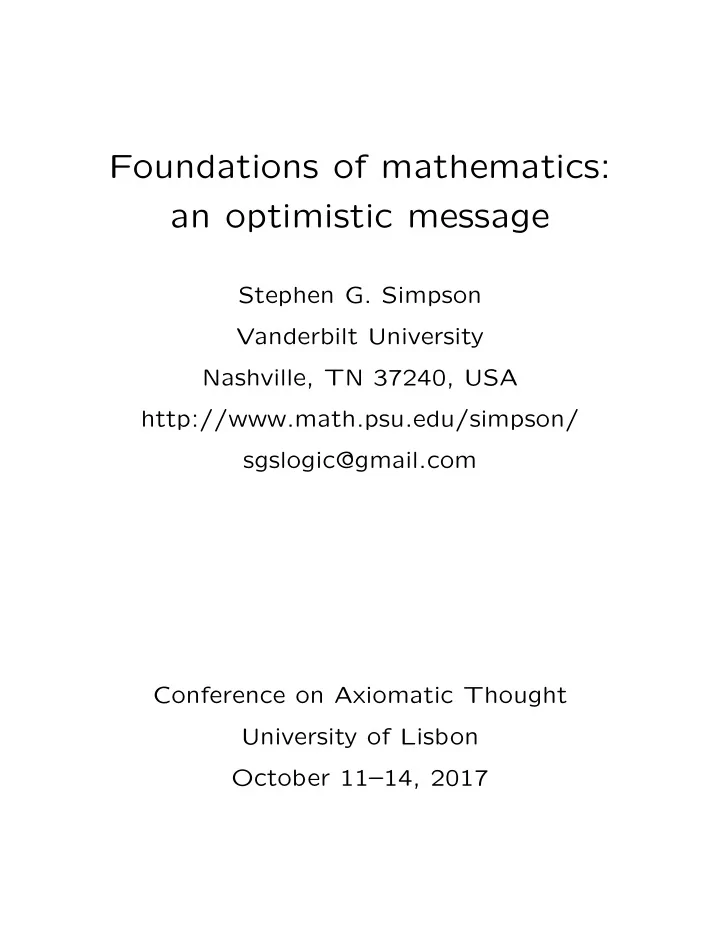

Foundations of mathematics: an optimistic message Stephen G. Simpson Vanderbilt University Nashville, TN 37240, USA http://www.math.psu.edu/simpson/ sgslogic@gmail.com Conference on Axiomatic Thought University of Lisbon October 11–14, 2017
Ng Kong Beng Public Lecture Series 黄光明公开讲座 Speaker: Stephen G. Simpson Pennsylvania State University, USA Date: 6 January 2016 Time: 6:30 - 7:30 pm Venue: LT31, Block S16, Level 3 Faculty of Science National University of Singapore 10 Lower Kent Ridge Road Singapore 117546 About the Speaker Stephen G. Simpson is a senior mathematician and "The infinite! mathematical logician. He is No other prominent as a researcher in question has t h e f o u n d a t i o n s o f ever moved so Plato and Aristotle mathematics. His writings profoundly the have been influential in spirit of man." -- David Hilbert (1862-1943) promoting the foundations of mathematics as an exciting research area. Abstract Historically, mathematics has been regarded as a role model for all of science -- a paragon of abstraction, logical precision, and objectivity. The 19th and early 20th centuries saw tremendous progress. The great mathematician David Hilbert proposed a sweeping program whereby the entire panorama of higher mathematical abstractions would be "Objective concepts of justified objectively and logically, in terms of finite processes. But then mathematics are in 1931 the great logician Kurt Gödel published his famous fundamental to my incompleteness theorems, thus initiating an era of confusion and skepticism. In this talk I show how modern foundational research has work in logic." opened a new path toward objectivity and optimism in mathematics. -- Kurt Gödel (1906-1978) For more information, visit www2.ims.nus.edu.sg and www.math.psu.edu/simpson/talks/nus1601/. Kurt Gödel. 17 November 2015. Online image. Retrieved from http://guncelmatematik.com/kurt-godel-kimdir.html David Hilbert. 17 November 2015. Online image. Retrieved from http://davidhilbertmth482.blogspot.in/ Plato and Aristotle. 24 November 2015. Online image. Retrieved from https://en.wikipedia.org/wiki/Philosophy#/media/File:Sanzio_01_Plato_Aristotle.jpg
The School of Athens (about 360 B.C.) by Raphael (1483–1520)
S D S S S 2 = the square root of 2 = D √ S . 2 is approximately equal to 99 √ 70 . 2 is approximately equal to 665857 √ 470832 . √ 2 is “exactly” equal to 1 . 4142135623730950488016 . . . .
Plato and Aristotle (about 360 B.C.)
David Hilbert (1862–1943) “The infinite! No other question has ever moved so profoundly the spirit of man.” Kurt G¨ odel (1906–1978) “Objective concepts of mathematics are fundamental to my work in logic.”
Hilbert’s Program (1926): Using the tools of mathematical logic Hilbert proposed to prove that all of mathematics, including the infinitistic parts of mathematics, is reducible to purely finitistic mathematics. In this way, the objectivity of mathematics would be confirmed. G¨ odel’s refutation of Hilbert’s Program (1931): G¨ odel used mathematical logic to prove that some parts of infinitistic mathematics are not reducible to finitistic mathematics. This includes the “medium” and “strong” levels of the G¨ odel hierarchy. Thus, the objectivity of mathematics is left in doubt.
The G¨ odel hierarchy . . . huge cardinal numbers . . . ineffable cardinal numbers . . “strong” . ZFC (Zermelo/Fraenkel set theory) ZC (Zermelo set theory) simple type theory Z 2 (second-order arithmetic) . . . Π 1 2 - CA 0 (Π 1 2 comprehension) “medium” Π 1 1 - CA 0 (Π 1 1 comprehension) ATR 0 (arithmetical transfinite recursion) ACA 0 (arithmetical comprehension) WKL 0 (weak K¨ onig’s lemma) RCA 0 (recursive comprehension) PRA (primitive recursive arithmetic) “weak” EFA (elementary function arithmetic) bounded arithmetic . . .
Reverse Mathematics: A series of precise case studies to determine which parts of mathematics belong to which levels of the G¨ odel hierarchy. Two discoveries: 1. Using the methods envisioned by Hilbert, we can prove that “weak” levels of the G¨ odel hierarchy are finitistically reducible, in the sense of Hilbert’s program. 2. Reverse-mathematical case studies provide solid evidence that the “weak” levels cover at least 85 percent of mathematics. This includes most or all of the “applicable” parts of mathematics. Combining these two discoveries, we conclude that Hilbert’s program is largely valid. My optimistic message: Most of mathematics has an objective basis!
Recommend
More recommend